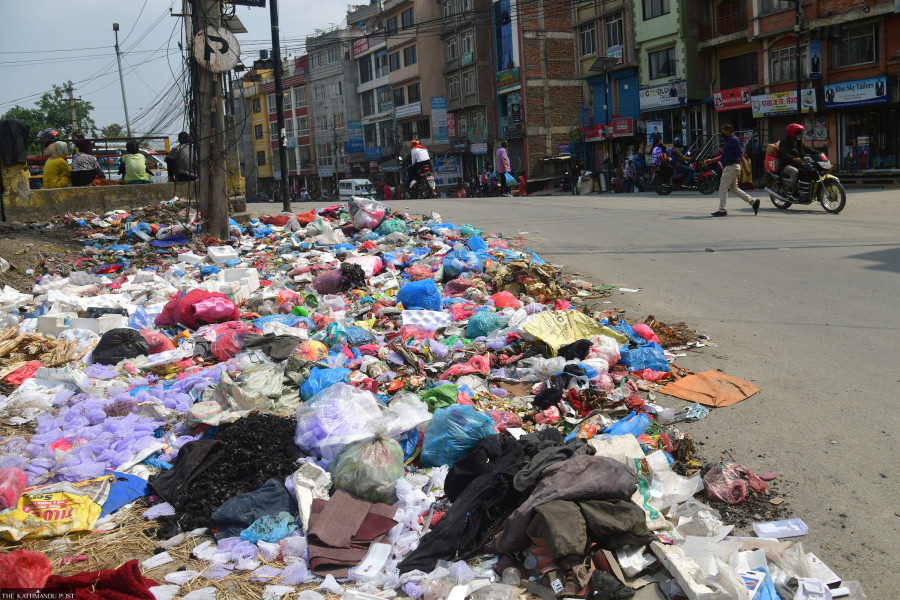Kathmandu
Teku residents launch protest against huge garbage buildup at waste transfer station
Garbage transport to Sisdole landfill remains halted for weeks after protests by Nuwakot locals.
Arjun Poudel
On Sunday, residents of the Teku area, which is in Ward 12 of Kathmandu Metropolitan City, padlocked the waste transfer station after piles of garbage collected from households in the metropolitan city and brought to the station were not disposed of for several days.
Enraged locals complained that they were forced to resort to protest the Kathmandu Metropolitan City’s failure to manage the garbage.
“They have turned the transfer station into a dumping site,” said Rajiv Man Shakya, a local of Mayalbari in Teku. “We can neither eat nor sleep properly because of the stench emanating from the garbage transfer station.”
Garbage transfer station is a facility where garbage collected from the households of the metropolis in small vehicles are unloaded and reloaded into larger trucks to send them to the landfill site.
Teku residents’ complaints come at a time when everyone residing in the Kathmandu Metropolitan City is keeping a close eye on who will become a new mayor. Among others, garbage management is one of the key tasks of the metropolitan city.
Addressing the issue of city waste management is one of the selling points of all the mayoral candidates in Kathmandu. As vote counting continues, garbage is piling up in Kathmandu’s nook and corners and on the streets.
Door-to-door garbage collection has been halted for about a month and the Environment Management Department of the Kathmandu Metropolitan City has stopped disposing garbage at the dumping site in Sisdole for the last 22 days.
Officials said that garbage collection and dumping has halted due to protests by locals in many areas on the way to Sisdole landfill site in Nuwakot.
The locals in some places have demanded better amenities, while in other places, the people don’t want the foul-smelling garbage trucks passing through their neighbourhoods.

Shiva Deuja, who works at a fruit shop near the transfer station, said that his owner left for home after a severe headache due to the strong smell from the dump.
“It has been very difficult to breathe here,” said Deuja. “Can you imagine how much we have been suffering?”
Locals of the Teku area said that their lives have become miserable.
“Not only do we have to bear the stinking smell but kites and crows also bring the rotting garbage to our rooftops and balconies,” said Raju Maharjan, another local. “Of all the things, we are deprived of even fresh air to breathe.”
Waste management has been a perennial problem in Kathmandu city, which produces around 600 tonnes of garbage every day. Kathmanduites have for long been raising the issue but authorities have invariably failed to address the problem.
“I am 45 and I have been residing here for the last 25 years,” said Rajiv Shakya, a lawyer. “We have seen many governments but none has worked seriously to address the garbage problem.”
Officials at the Environment Management Department at the Kathmandu Metropolitan City said that due to protests by locals in several places, including in the Sisdole area, they have been unable to send garbage trucks to the dumping site since April 24.
“The protest is not only in one place but in several places,” said Sarita Rai, chief of the Department. “Locals in different places have different demands. But how can we agree to their demand that garbage trucks should not use the road in their areas?”
According to a rough estimate by the metropolis, 18 municipalities in the Kathmandu Valley generate over 1,200 metric tons of solid waste a day and of that amount 50 percent is generated from the Kathmandu Metropolitan City alone.
As garbage disposal has stopped for the last 22 days, over 26,000 metric tons of garbage has piled up in the Valley. The City’s Environment Management Department said that it will take around 10 days to clear the garbage of the Valley if obstruction is cleared immediately. Each day 150 garbage trucks would transport Valley’s garbage to the dumping site in Sisdole, Nuwakot.
Rai, chief of the Environment Management Department, meanwhile, admitted that there is no possibility of any agreement between the City and the locals as the demands are impractical and impossible to fulfill.
Since the obstruction started in Sisdole, the City has been dumping the Valley’s garbage at the transfer station at Teku.
“I can’t imagine how difficult garbage management will be this monsoon when rains damage the road to Sisdole and garbage transfer remains halted for many days,” said Rai.




 11.12°C Kathmandu
11.12°C Kathmandu











